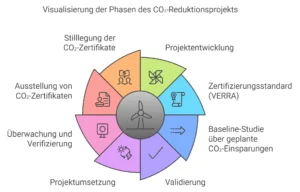What Does CO2 Neutral Mean?
The terms CO2 neutral and climate neutrality are becoming an increasingly common part of our everyday life, but what exactly do they mean? CO2 neutrality describes a state where no additional carbon dioxide emissions are released into the atmosphere. This is achieved through the reduction of emissions and the offsetting of unavoidable emissions, e.g., through climate protection projects.
Why Is CO2 Neutrality Important?
Climate change is one of the greatest challenges of our time. A major cause is the rising emissions of greenhouse gases, particularly carbon dioxide (CO2). Shifting to a CO2-neutral lifestyle helps reduce the ecological footprint and creates a more sustainable future.
Impacts of CO2 Emissions
- Global Warming: Average temperatures rise, intensifying extreme weather events such as heatwaves or floods.
- Shrinking Ecosystems: Habitats for plants and animals are disappearing.
- Rising Sea Levels: Glaciers are melting, and coastal regions are under threat.
Steps to a CO2-Neutral Lifestyle
1. Calculate Your CO2 Footprint
To effectively reduce CO2, it is essential to know your own CO2 footprint. With the help of a CO2 calculator, you can quickly analyze which activities are particularly harmful to the climate.
- Use tools such as the CO2 Calculator from werde-co2-neutral.de to evaluate your emissions.
- Consider areas such as energy consumption, transport, diet, and consumption.
2. Reduce CO2 Emissions
Energy Efficiency in Daily Life
- Switch to renewable energy sources such as solar or wind power.
- Use energy-efficient appliances and LED lighting.
- Reduce electricity consumption through smart technologies.
Environmentally Friendly Transport
- Use public transport, bicycles, or electric cars.
- Carpool to share emissions.
- Avoid unnecessary flights and prefer train travel.
Sustainable Diet
- Choose local and seasonal foods.
- Reduce meat consumption, especially beef.
- Avoid food waste by shopping consciously.
3. Offset Unavoidable Emissions
Not all emissions can be avoided. This is where CO2 offsetting comes into play. Sustainability projects, such as reforestation or investments in renewable energy, offer opportunities to offset unavoidable emissions.
- Support climate protection projects that have a sustainable impact.
- Look for certifications such as Gold Standard or Verified Carbon Standard to ensure quality and transparency.
Sustainability Projects: A Contribution to the World
Examples of Successful Climate Protection Projects
Reforestation in Tropical Regions
Trees capture CO2 from the atmosphere and promote biodiversity. Initiatives like planting mangrove forests protect coasts from erosion and store large amounts of carbon.
Investments in Renewable Energy
From solar parks in Germany to wind power projects in India – renewable energies replace fossil fuels and contribute significantly to CO2 reduction.
Protection of Peat Bogs
Peat bogs are natural CO2 storage systems. Protecting them prevents the release of stored greenhouse gases and preserves valuable habitats.
Germany’s Role in the Fight Against CO2 Emissions
Germany has ambitious goals for climate neutrality. Programs such as the promotion of electric mobility and the expansion of renewable energy contribute to reducing Germany’s CO2 footprint.
Benefits of a CO2-Neutral Life
- Financial Savings: Lower energy consumption means lower costs.
- Health Benefits: An active lifestyle and sustainable diet promote health.
- Social Contribution: Each individual helps protect future generations.
Conclusion: Acting Together for a Sustainable Future
The path to CO2 neutrality begins with small steps. From using a CO2 calculator to supporting sustainability projects – every action counts. Visit werde-co2-neutral.de to reduce your emissions and make a positive impact on the environment.



